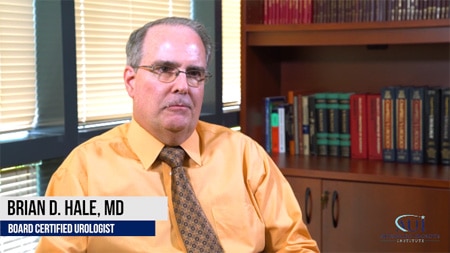My name is Yaser Bassel, I’m a board certified urologist with Advanced Urology Institute. We see a lot of women, in particular for issues with incontinence or involuntary loss of urine. And there are multiple reasons for having that
Continue readingRadiation Therapy for Prostate Cancer
My name is Yaser Bassel, I’m a board certified urologist with Advanced Urology Institute. With Radiation Therapy there are different means of administering radiation, there are seeds that can be implanted, there’s external beam radiation therapy and sometimes radiation
Continue readingWhat is Robotic Prostatectomy According to Dr. Yaser Bassel?
My name is Yaser Bassel, I’m a board certified urologist with Advanced Urology Institute. When you’re talking about robotic prostatectomy we typically lean towards doing that with younger patients who have a long life expectancy. And those patients that we
Continue readingWhat Common Surgeries Does Dr. Brian Hale Perform?
Dr. Brian Hale of Tampa, FL discusses the common surgeries he performs including kidney stone removal, prostate surgery, and cancer treatment.
Continue readingWhy Did Dr. Brian Hale Choose Urology as a Specialty?
Dr. Brian Hale: One of the nice things about urology is that most of the patients we see we can actually treat and help.
Continue readingHow Does Dr. Yaser Bassel Approach Treating Low Testosterone?
My Name is Yaser Bassel, I’m a Board-Certified Urologist with Advanced Urology Institute. Low testosterone at this point has come to the forefront a lot of times because of the advertising done by manufacturers of Testosterone. But for men
Continue readingHow Did Dr. Brian Hale Become a Urologist?
Dr. Brian Hale of Tampa, FL talks about his journey to becoming a urologist at Advanced Urology Institute.
Continue readingHow Does Dr. Brian Hale Approach Bladder Cancer Treatment?
What Treatment Options Are Available for Prostate Cancer – Dr. Amar Raval
The first is watchful waiting, that’s knowing that you have prostate cancer but you don’t want to really do anything about it.
Active surveillance is when you’re diagnosed with either low risk or low volume intermediate risk prostate cancer, you follow up with PSAs and digital rectal exams every three to six (3-6) months and then biopsies subsequently. If it advances or it’s a higher stage, then you treat it.
There’s also radiation therapy with hormones, brachytherapy, and of course surgery which is a radical prostatectomy that can be done open or laparoscopically/robotically.
So there’s plenty of options out there. It can be a very confusing type of cancer to have and I think it warrants us long conversations with the patients so they know all the options that are available.
Vasectomy or Tubal Ligation: Which One to Choose According to Dr. Yaser Bassel?
When Is the Right Time for a PSA Test, According to Dr. Yaser Bassel?
How effective is a vasectomy reversal?
My name is Yaser Bassel. I’m a board certified urologist with Advanced Urology Institute.
When we counsel patients before they get a vasectomy, we do tell them that this is considered a permanent form of sterilization. However vasectomies can be reversed. The vasectomy reversal process is typically one that is not covered by insurance so it can be expensive but it is possible and typically with seventy-five to eighty percent (75-80%) success rates. [While], I do not personally perform the vasectomy reversals themselves, I do have a partner that specializes in that area. So if that is something men are interested in, that is something that is offered by our practice.
Common Prostate Health Issues – Dr. Yaser Bassel
Advances in ED treatment
My name is Brian Hale, I’m a board certified urologist working with Advanced Urology Institute.
When I first started urology we had injection therapy and surgery, so we did a lot of surgery for erectile dysfunction. When Viagra came out in the late 90s that obviously changed everything, and now we have a lot of options besides Viagra, medically. So the treatment of erectile dysfunction transitioned from a surgical problem to a medical problem. We still do treat men with surgery if they fail the medical options but the numbers now are very low for patients who undergo surgery for erectile dysfunction.
What Is Screening for Prostate Cancer?
My name is Brian Hale, I’m a board certified urologist working with Advanced Urology Institute.
Certainly any man over the age of 50 should be screened for prostate cancer, it is the #2 cause of cancer death in men. There’s a lot of controversy about the PSA because of its lack of specificity: a lot of men who have elevated PSA do not have prostate cancer, but unfortunately we don’t have a better task. We have a rectal exam but that misses more cancer than the PSA, so to stop screening for prostate cancer was a mistake and they actually only reversed that recommendation on screening for prostate cancer based on what was happening. We were seeing a lot of men with Metastatic disease.
 I started private practice in 1995, and from 1995 until the last five (5) years or so, I didn’t have any metastatic prostate cancer patients in my practice, and now I have a lot, and a lot of it was from a lack of screening. I have patients that were trying to do everything right: watching their weight, exercising and they stopped screening for prostate cancer because of the recommendations. They would have symptoms like blockage from their prostate or blood in their urine. We would check a PSA and we would find it to be extremely high and later find they have metastatic disease because of lack of screening. I have several patients I know on the top of my head that have had that problem, unfortunately. So I would definitely recommend that they continue screening for prostate cancer. [While] it is true, we need a better test than PSA, but just because we don’t have a better test doesn’t mean we should stop screening and I think the government is coming back around to that because the treatment of metastatic prostate cancer is a lot more expensive than the treatment of early prostate cancer.
I started private practice in 1995, and from 1995 until the last five (5) years or so, I didn’t have any metastatic prostate cancer patients in my practice, and now I have a lot, and a lot of it was from a lack of screening. I have patients that were trying to do everything right: watching their weight, exercising and they stopped screening for prostate cancer because of the recommendations. They would have symptoms like blockage from their prostate or blood in their urine. We would check a PSA and we would find it to be extremely high and later find they have metastatic disease because of lack of screening. I have several patients I know on the top of my head that have had that problem, unfortunately. So I would definitely recommend that they continue screening for prostate cancer. [While] it is true, we need a better test than PSA, but just because we don’t have a better test doesn’t mean we should stop screening and I think the government is coming back around to that because the treatment of metastatic prostate cancer is a lot more expensive than the treatment of early prostate cancer.

















